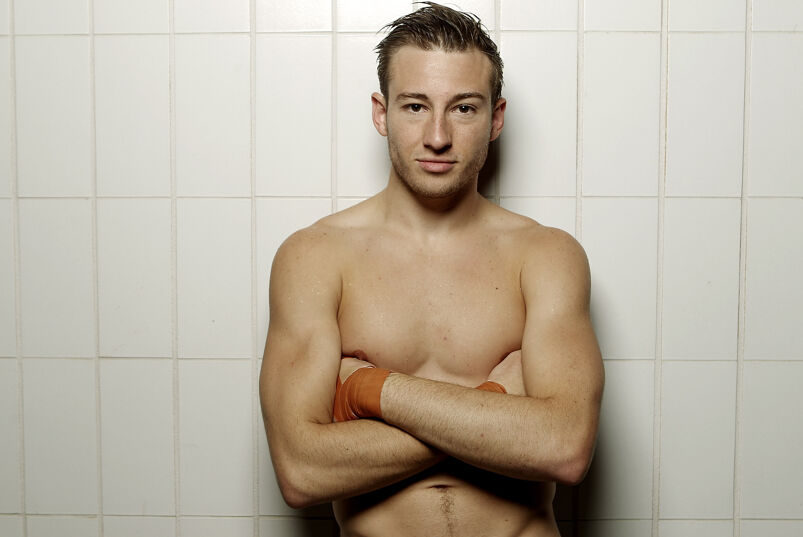
Olympic diver Matthew Mitcham has been open about his struggles getting to the Olympic Games in the past: his coming out journey, his battle with drugs and alcohol, and mental health struggles that all tried to stand between him and his dream.
In a candid new interview with PinkNews, the athlete dives deep to discuss his fight with addiction and the road forward from it.
Mitcham explains that, throughout his diving career, he’d have to enter a detoxing phase as soon as a competition was on the horizon.
“That process was just horrible,” he says.
How about we take this to the next level?
Our newsletter is like a refreshing cocktail (or mocktail) of LGBTQ+ entertainment and pop culture, served up with a side of eye-candy.
“Every single time, because it was so awful, I would just promise myself with every single cell in my body that I would not use drugs again after that competition. And every single time I just couldn’t keep that promise to myself, because being inside my own head was so unbearable.
“There’s something quite soul destroying about making a promise to yourself with absolute conviction and not being able to keep it,” he explains. “There’s something quite soul destroying about making a promise to yourself with absolute conviction and not being able to keep it.”
Related:
Mitcham’s struggle with drugs and alcohol had developed in his teen years after his depression had started to emerge.
“I could see that my drug use already was a bit problematic at that stage,” he says. “I felt like it was my ticket to being special – like it was my only option.”
Even winning gold at the Olympics in 2008 couldn’t break the cycle, as that unimaginable high dove back down once he returned to normal life.
“All that stuff came back with vengeance after Beijing,” he recalls. “I shamed myself a lot for having depression and for feeling the way I felt because I felt like it was unjustified.”
The diver was able to pull out of the drop once he reached what he calls a point of “absolute desperation”
“I literally could not do it by myself. It was a last resort, really, to go to rehab,” he says.
“There was a lot of fear for me – being in the public eye, being recognizable, being in sport – there’s a huge taboo with drugs and sport,” he explains. “There was a lot of fear that prevented me from doing it but ultimately it was the best decision I ever made.”
Related:
Dustin Lance Black shows off husband Tom Daley’s booty
Tom Daley, Dustin Lance Black and Andrew Garfield together… *swoon*
His bravery to ask for help, even while in the public eye, paid itself back tenfold. As he can contend today, his going to rehab finally helped him break the cycle.
“Using drink and drugs is a really powerful way to change the way you feel,” he explains. “Going to rehab, I learned lots of other tools to change the way I feel – much more effective ways to change the way I feel – that don’t have these added consequences.”
Mitcham, seven years sober, now works to help others kick their addiction to the curb the same way his rehabilitation helped him.
The Olympian volunteers with the organization Controlling Chemsex, which works to combat the reliance on drugs in sexual encounters in the LGBTQ+ community, especially for gay men.
“I’m very passionate about helping people who do have these issues because it is insidious,” he says.
“People should be able to have sex without the shackles of having to be high.”
It doesn’t take the bravery of jumping off a 10-meter-tall diving board to kick addiction; it just takes the courage to ask for help.




















scotty
those are hard promises to keep. i’ve walked a mile or three in those shoes. happy for him.
charlieeod74
Yep I’ve walked those steps also. Just celebrated 25 years of sobriety. What a journey it has been.
PollyDarton
I was just wondering where our monthly Matthew-Mitcham-recovery article was!
barryaksarben
we could have one week since he is TRYing to help others in our community. It takes great strength to be so open about some of your lioness problems. I lost a good friend who had a serious meth problem and our group of friends tried to never judge him and to show him nothing but love but in his case nothing worked and it has left such a huge gap as he was a wonderful bright funny loyal guy and I will miss him forever. Thank you Matthew for being a light in this hug4e dark problem
Vince
Why not just come out and say it. Yeah, there might be some other drugs like GHB or ecstasy in there but we all know the drug that people trade everything in their lives for and the notorious connection to marathon sex. Meth or PNP. Alcohol will only bring you right back to it.
Good that he’s recognizing it and getting help. I understand the naive promises part too. It sucks and is totally soul destroying. It took me years to accept I wasn’t in the drivers seat and needed help myself.
JClark
Agree with you almost 100% except for the reference to alcohol. For many people, including myself, alcohol just isn’t the same as meth and doesn’t take us to that doorstep. I’ve been without meth and other party drugs for a decade now, but I’ve always used alcohol responsibly (never to the point of intoxication). That’s not to say alcohol isn’t a problem for many meth addicts, but I think the alcohol=meth perspective of some treatment programs is counterproductive. Back in the day, I never had sex without using meth, and never used meth without having sex. I never had that relationship with alcohol.
RIGay
I thought that was a photo of David Duchovny.
It’s hard to be young, closeted gay and working in a profession that demands you submit 100% of your self to training for the discipline.
CalderBear
Misleading headline, he does say he never took part in chemsex himself.